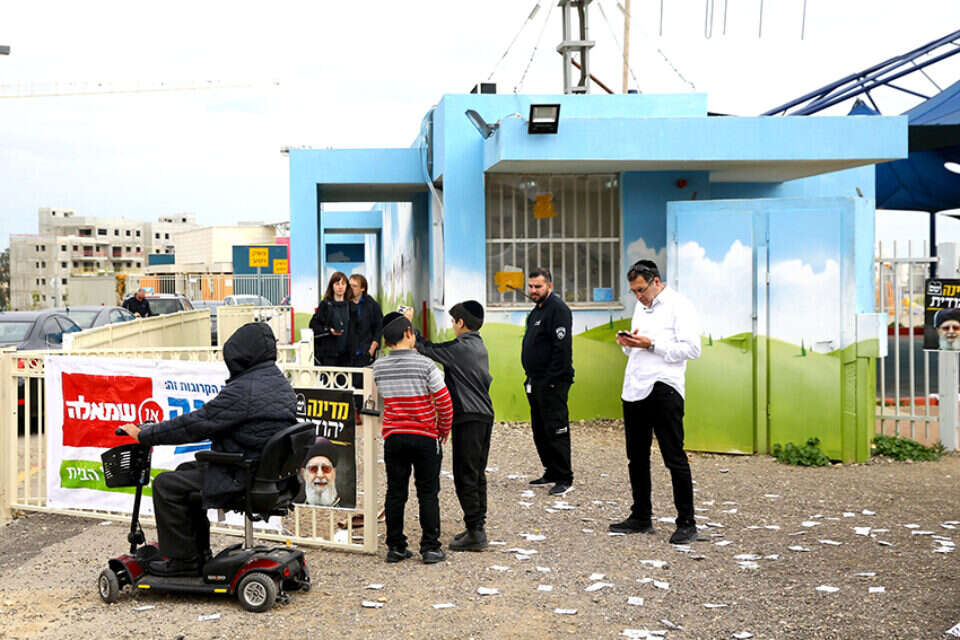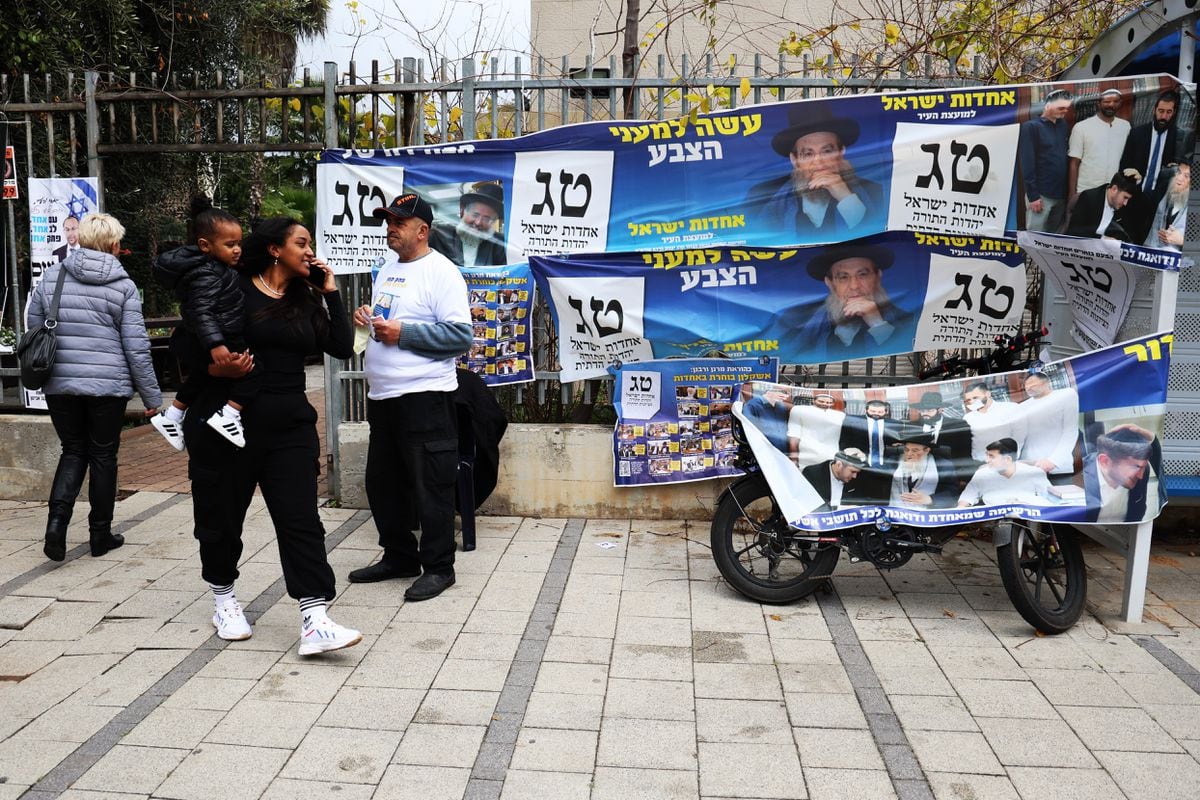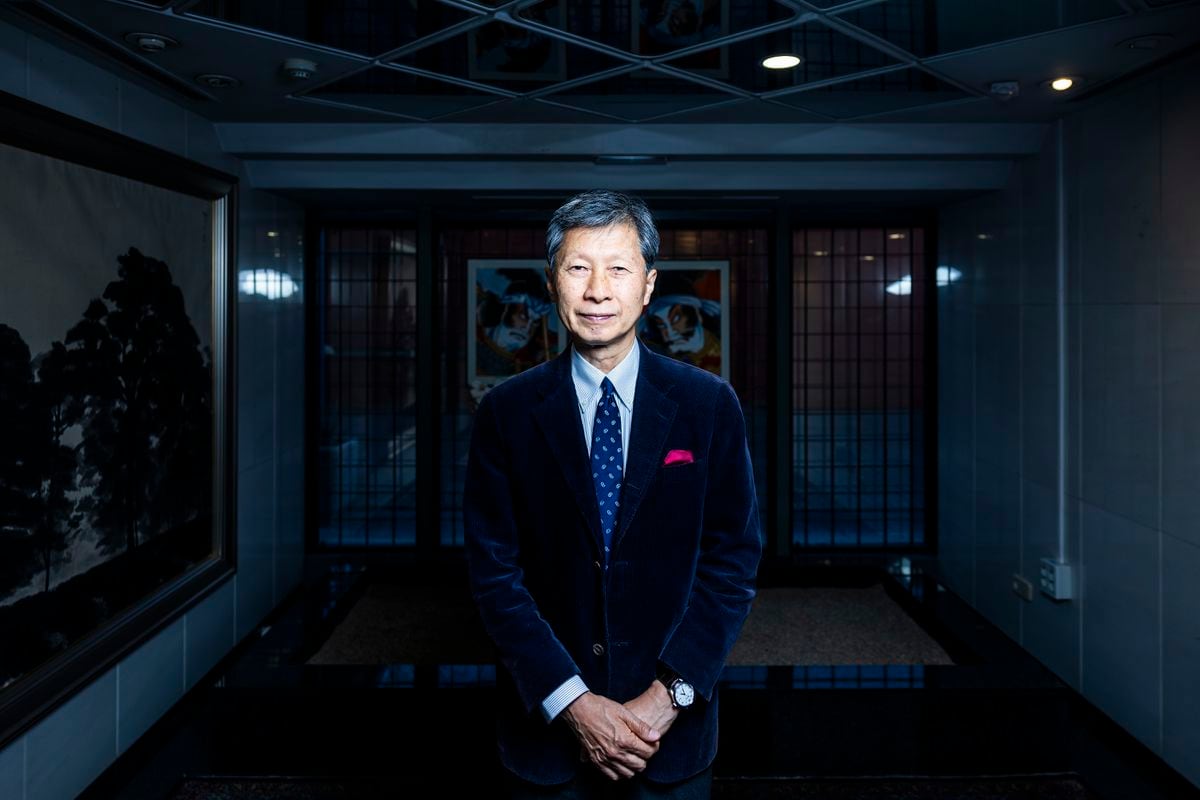You know, in the end, after they finish digging into the results of their samples, some commentator or broadcaster will come and ask some expert, 'So why is the periphery voting against itself again?'
Let go of the crazy generalization that we are all the same.
Where does this audacity and arrogance come from to state that we are voting 'against' ourselves?
What do the studio people from Tel Aviv even know about our lives and what is right for us?
When will they understand that if anything, we are voting against them, not against ourselves?"
Speaker: Esti, place: Peretz Center, Dimona.
Her sharp tongue will come again.
In a world without myths and history, "periphery" is nothing but a statement of fact.
There is a center, and there are those far from the center.
But in Israel every definition hides innumerable complexities, caveats and stupid scorpions.
How do you measure an Israeli "periphery"?
Kilometers from Tel Aviv or far from the plate?
In the socio-economic index or in the exclusion index?
And in the context of elections and myths that have formed around them, the big question is whether the "periphery" is really voting "against itself", and translated into Hebrew less politically correct: voting for the right-wing parties, and especially for Likud - instead of the social, social-democratic parties.
As a permanent cloud, this question hangs over the consistent and solid support of the peripheral cities, especially in the south, and every election it rises before and after the elections, through the sayings "If this is what the bibists want, then this is what they will get".
In other words, voting to the right means one thing - the continued neglect of the periphery behind, perhaps because the budgets are channeled to the settlements.
"One of the basic mistakes people make is to attribute selfish and local motives to voting patterns by locality," Adi Vakanin, a high-tech woman, also from Dimona, tells me.
"The Dimonites do not necessarily look at Dimona and think where their situation can only be improved. The Likudnik Dimonites are in favor of the Land of Israel, in favor of encouraging settlements, they do not cut themselves off from the national aspect, subject to their narrow interests as residents of the periphery."
To check this, I went on a journey, not far from home, between four similar and different cities.
Four cities where the majority of residents voted for Likud in the last elections.
I was looking to talk to the young people of the area, but not only.
The starting point was to examine the gap between peripherality and nationalism, between local and national interests, to what extent it is class that determines, or that once again "the tribe will have its say" and the periphery will "vote against itself".
Station 1: Beer Sheva
Distribution of votes in the 2021 elections:
Likud - 42%, Yisrael Beitenu - 9.7%, Yesh Atid - 9.6%, Shas - 7.8%
42 percent support for Likud in the 2021 elections.
Cafes at the crossroads - an excellent place to meet the human diversity of the Negev.
A point of friction between vapors and identity, mothers from community centers, and cellular fathers, computerized army officers and Bedouin women feeding a toddler an "Israeli" salad. They all steal a sweet moment of black bitterness before or after the day's labor. Sahar Dolev, 29, serves the coffee crowd on the day , and an avid gamer at night. "In the past I always voted for Likud," he tells me immediately, "but in the last two years I also voted for Gantz, because of his function as defense minister in the Wall Guard.
When I saw that Gantz put the quarrels aside and worked for the country, I said to myself that this is someone you can trust from a security point of view."
And who do you think you will vote for in the upcoming elections?
"Right now I'm leaning towards Likud, because the situation in the south and in Be'er Sheva is not good. I don't feel safe when there are drivers rioting on the roads. In any case, I think that external security is more important than internal security. And it's important to maintain this so that we don't end up in a situation where, during a war, non-Zionist elements in the coalition They will decide whether we go to battle or not."
Prof. Danny Pilak: "The claim that the periphery is voting against itself is patronizing. In 2011-2019, the Likud's main supporting groups - 4-7 tenths - experienced a considerable improvement in their economic conditions and social mobility"
"In the past year, you haven't felt missiles here," interjects K., one of the residents of the cafe, "because Bennett's policy was that every balloon - a response. And during Bibi's time - there was nothing, because with him there is always nothing."
Sahar firmly replies, "This was Bennett's policy to prevent the left from going crazy. No one wants Hamas to throw missiles at us. But we have to be realistic: we will not be able to reach a peace agreement with the Palestinians in the near future. There will only be peace like the Abrahamic agreements with the Arab countries, and maybe Only when the Palestinians feel that they are alone will they come out of their movie."
K. shakes his head, struggling with Sahar's words.
He arrived in Be'er Sheva several decades ago from the northern outskirts, and is currently in a senior management position at one of the high-tech companies.
I put the question on the table, if this is really the security reasoning or if in the end, as the cliché article says, they return home, to Likud.
to my baby
Saar is quick to respond.
"I don't see myself as part of the 'Bibiists'. I am anti-communist and anti-fascist. And Bibi is really not a fascist and does not see himself as someone who puts himself above everyone else. He is the leader of a party and represents a population that has a world view that is contrary to that of the left. The vision The left's view of peace with the Palestinians is unrealistic and irrational at the moment. There is currently no solution until another generation comes along. And the Likud is more realistic about the way the country should be run until we get there, and not go for delusional ideas that won't happen."
So To Bibi Or Not To Bibi, I turn the question to K.
"Most people vote tribally. My father voted that way and so do I. Now people are looking for justification for their 'choice of tribe.' A lot of so-called 'facts' are simply not true. Fake news gives people justification for their gut feelings, but when the justification ends or it meets the reality, suddenly the stomach also starts to turn, and they start asking questions. The social networks are polarizing, and there are cynical people who do not help this. See Bibi's entry. And this is the thing that hurts me the most, that the people are divided. Some would say that it used to be more divided than today - Altalana, the zealots in Jerusalem that burned wheat warehouses, but today it feels like a new record."
So if a "full-on" right-wing government is elected, from the Likud to Ben Gabir, are you ready and willing to accept its sentence in the name of "Ehedot Ha'am?"
"I don't know what I'll do. I can relocate without a problem. But if Smotrich and Ben Gvir come up, the ones who have to worry are all the girls who are on Tiktok and Onelipans today. They'll have to wear burkas and hijabs."
Station 2: Ashkelon
Distribution of votes in the 2021 elections:
Likud - 40%, Israeli Beytinu - 15%, Shas - 9.9%, Yesh Atid - 9.3%
A perfect beach, antiques and real estate prices are skyrocketing. Welcome to Ashkelon, and meet Stav Rosh, 22 years old. A student at Sapir College and Ashkelon.
Which party did you vote for last time?
"Bibi".
Why did you answer Bibi and not Likud?
"Because that's what we've heard all our lives. If you ask a typical Ashkelon, he'll answer that he votes for Bibi, not Likud. It rolls well on the tongue, it fits the norm, the majority here is right-wing, and the right-wing is Bibi. But in any case, my views have changed over the past two years . I switched to Blue and White. There was even a thought in the direction of Lieberman in general, and in the last elections I went with Gantz, mainly because I didn't know who to vote for."
And this time you already know who you will vote for?
"Not completely. I have right-wing views and I have center views, but what I want is a change on the economic level and on the social level. For example, the LGBT community, to allow people to marry.
But above all, they won't kill us with the cost of living."
Adi and Kanin,
Adi Vakanin, Dimona: "It is a mistake to attribute selfish and local motives to voting patterns by localities. Dimonas do not necessarily look only at Dimona. They do not cut themselves off from the national aspect, subject to their narrow interests as residents of the periphery"
Cost of living before security?
"As an Ashkelon, security is most important to me. It doesn't make sense that on Friday night we were shot at and there's an alarm, and all the news is going on as usual. But the cost of living is burning. I'm 22 years old studying communication, and I really hope I don't have to move to the center to promote myself. I love My place, but why do I have to pay an astronomical price for a dilapidated apartment? Why can't working couples buy an apartment in Israel? My father has to work abroad to help his children live here?"
Have you considered voting for one of the "economic" parties?
"No. These parties presented the problems very nicely, but without a real solution. Hadar Mokhtar is truly a cannon and kudos to her, it's just hard for me to believe that she will rise and I think about my vote, I don't want it to be wasted. And for me, the cost of living also means developing the The south, it's impossible for everything to be in the center.
"When will someone come and say - I take the south with both hands and give a job?
They once said that simple people live in the suburbs.
Not asking for much, just to exist, to have children happily.
But my generation is already different, it is more aware.
This is an ambitious generation that wants to conquer the world, wants an exit and a start-up - and wants to continue living where it grew up and loves."
And yet, a great many people in this periphery, even in the new generation, vote for the right and Likud.
"I think it's just convenient for people to stick to what they know, especially in the southern region, which tends to the right, and there is no one who represents the right like the Likud, and in particular Bibi. Get used to this government. You feel deprived anyway, so I think it's more convenient to stay in the safe place, which is with the Likud. When the wave of attacks broke out While Bennett was prime minister, it was easy for everyone to say 'everything is because of Bennett'. We forget that even when Bibi was in power there were terrorist attacks, the cost of living was high and there were no jobs and opportunities in the periphery."
Hasn't the periphery developed in recent decades?
"There is no doubt, but because people here are shouting their pain, not because there is someone in power who has love and affection for the southern region. Absolutely not. There are amounts of young people here who just want to break through, just want to succeed and are pushed into a corner. But those who want to move forward have to move to the center Because that's where everything happens. Why? Why can't we establish a high-tech park in all the dead areas in the Negev, a communication park with public relations and advertising offices, an acting school, why? A few years ago, they established the city of the Behadim.
Why not continue to develop?"
You define yourself as right-wing. Is there any chance that you will return to Likud after this tour?
"Likud lacks trust. I personally find it difficult to vote for a prime minister who has criminal cases against him. If they told a random person on the street, come and vote for person X who will be in charge of your life, but you know that this person has cases with the police for bribery. Would they vote for him? Definately not".
Station 3: Yeruham
Distribution of votes in the '21 elections
Likud - 40%, Shas - 12%, the Right - 10%, religious Zionism - 7.3%
Children with big caps play on green lawns, next to the boutique hotel in Yeruham.
Every now and then a boy or girl rushes to a music lesson in the conservatory next to the lawn.
Tamir and curled, the 25-year-old Emir of Israel, sings and plays the oud for passers-by who stop to hear a young man who performs old music so well.
"I had an intuition about Yeruham, I knew there was oriental music here, and I came here from Ashkelon because I wanted to get into the depth of things. The rent here is cheap and I could have fun getting into music, so I came to study here in Kolana - the school for contemporary oriental art."
On the study bench he met Chen Ohana, who came from Givat Olga.
The two became a couple and stayed together after the end of the school term.
"I came from a right-wing house, and in the past I voted right," Chen tells me, "but in recent years I have been in the political center. The many election campaigns allowed me to experiment with voting for different parties, until I gave up. I felt it was a joke already, that the elections were not meant to serve the public but were meant to serve The people in the chairs who don't want to move from them. Their fight was an internal fight 'Bibi yes, Bibi no', it in no way affected the good of the general public. That is why today I choose with the social voice in mind more than the security one. Unfortunately, I did not find the social voice on the right which I support today."
Stav Rosh, photo: Liron Moldovan
Stav Rosh, Ashkelon: "It is convenient for people to stick to what they know, especially in the southern region which tends to the right, and there is no one who represents the right like the Likud and especially Bibi. Get used to it. You feel disadvantaged anyway, so I think it is more convenient to stay with the Likud."
"I came from a house that leans to the right," adds Amir.
"But politics didn't interest them too much. They will vote traditionally, for what they are used to - Likud. For the most part, I also voted within the right, I voted for Feiglin once, but my views changed. I realized that my choice did not lead to stability in the country, and I thought it was more correct to vote for what would bring More stability for the entire population and what will free up the state's budgets, and I preferred that over my personal opinion."
In the more western cities, Be'er Sheva and Ashkelon, security is strongly emphasized.
"The issue of security is very important to me, but I feel that the use of security is cynical. If it's not the corona virus, then it's Iran. It's as if you're supposed to be in anxiety all the time, so you deal with what you should be afraid of. But the real insecurity is the cost of living. The real security is feeling like a person A young man, if I work hard and earn decent money - I will have a chance to buy an apartment and build a house. This is the greatest security I can hope for in the future."
"It doesn't matter if it's left or right," says Chen, "no prime minister will give the country to anyone. The most important thing right now is the social consideration, and we are pushing that aside."
What does this mean from a partisan point of view?
"In the past I thought the Likud was more social and cared more about the periphery. Today there is a feeling that the Likud is no longer connected to the people. I no longer believe in politics in general, and I don't see that there is a figure who will broadcast and do the right thing. I hate to tell you, but the distrust I have In the system, he is extremely extreme."
"Let's go, let's not keep ruining the evening," concludes Amir, "I think you've already understood, we're quite discouraged by the 'politikana'. It seems to me that in the end I won't go to vote at all. In order to know who to choose, you have to think, decide and invest effort. I understand That it's not worth it, there is no one I would choose and feel that he will really help me and that he really wants my best."
Final stop: Dimona
Distribution of votes in the '21 elections
Likud - 55%, Shas - 11%, Yisrael Beitenu - 6.7%, Yesh Atid - 6.3%
Evening descends on Peretz Dimona's chin.
Cafes, appliances and luxury stores for the middle class.
Esti, whom you already met at the beginning of the round, is sitting there for an evening of friendship and sushi, without children, husbands or real names, together with her friend, Revital.
Their reservations about my point of departure arise immediately at the beginning of the conversation.
"I'm not at all sure that the periphery has a different voice than anywhere else in the country. For me, the periphery is not an individual but a choice. The more significant consideration for me is the insane cost of living in which we live, and this is all of Israel and not unique to the periphery."
I'm being a little too assertive.
"It's a waste of your time, and all these questions are unnecessary. At the end of the day, all politics in Israel is white, the national camp, right or left. There are simply no Mizrahi who shout what is needed, and if there is any Mizrahi who dares to shout, then it is considered lying or whining."
"That's not true," Reuital replies, "there are many Mizrahim in politics, and they have quite a bit of power."
Chen Ohana, Yeruham: "I came from a right-wing house and in the past I voted right-wing, but in recent years I have been in the political center. Today I choose with the social voice in mind more than the security one. Unfortunately, I did not find the social voice on the right."
"Really strong," Esti replies.
"They have a seat in the Knesset and a driver with a power steering wheel, that's all the power they have. At best, they can make their home, and that too will be used against them one day in court if they dare to raise their heads. But in the end, who leads the country? Not Dodi Amsalem, nor Amir Ohana and not Miri Regev. And here we are once again going to the elections to decide who will rule us - Lapid, Gantz or Bibi? They are all Ashkenazim to the bone."
But what does their origin matter to the decisions they make as prime ministers?
"If it doesn't matter, then how is it that for 74 years there has been no Mizrahi prime minister for the State of Israel?"
And when Amir Peretz ran for Prime Minister, did you vote for him?
"Well, yes! First time in my life that I voted for the array."
And your neighbor Miroham Michael Bitton is unworthy in your eyes?
"He deserves, of course he deserves, especially if he raises his voice and puts himself out there. He is a man of principles and values, where will you find such people in politics today? My dream is that such a figure will be present in the elections completely."
But he is present in the elections.
"Really present... if the head is Ashkenazi, what are his chances of really having an impact?"
"I don't agree with you," says Revital.
"The sectarian discourse should be eliminated. True, there was and is discrimination, but I don't want our children to experience it."
"Because if we don't say it out loud, then it doesn't exist?" Esti replies.
"There is a well-oiled system of power conservation here, which determines which people will go to 8200 and which will go to armaments."
And how is this reflected in your ballot?
"I don't feel that in politics I can influence. I believe that I can influence society itself personally, but definitely not by voting."
want to experiment
"Trying to label it why Dimonai votes for Likud, or how it meets the vote only through localism, is a great shame," Adi Vakanin repeats.
"The traditional peripheral population assigns a very important place to nationalism, and this is what mainly determines the voting patterns."
Many young people tell me that they left Likud in the last election campaigns. Some out of desperation, some because they no longer find themselves in this party. Not necessarily in others either.
"I understand what they feel, for the simple reason that all Israeli citizens are tired, not just the young. And young people, whose whole lives have passed under a certain prime minister, curiosity drives them. They want to experience and feel that they are in their place, that they have done something. And I can understand them." .
Will they return to Likud?
"That's an excellent question, I don't know. Surveys show that young people in recent years show more right-wing tendencies. I think some of them will definitely return to Likud, but is this a trend? Even the best pollsters don't know."
How do you explain the great enthusiasm of young people from Ben Gvir, for example?
"Because he offers a solution, in his opinion, to a problem that has been ignored for years. People feel abandoned in the south and in the cities involved. This is some kind of protest vote, they feel that only he understands the difficulty they are facing, and they say we didn't succeed with the soft right, we can check with him. The truth I can understand them. I know people around me who switched from Likud to Ben Gvir, and I don't try very hard to convince them otherwise because I understand the sentiment. Especially in a place like Dimona, when you see the problems with your eyes and no one answers it, and Ben Gvir offers treatment for this issue ".
The theory of choice
"The claim that 'the periphery is voting against itself' is a patronizing, elitist and blind claim to reality. But Israeli liberalism is blind," Prof. Danny Pilak from the Department of Politics and Government at Ben-Gurion University tells me at the end of the trip.
"Every choice is a combination of rationale and emotion. Usually in liberal circles they think that they are the rationale and all Netanyahu fans are the irrational ones. Balfourism is blind and puts the emphasis on Netanyahu's pendant. They forget that the absolute majority of Likud voters are not the so-called 'bibists.' The Bibiists are not 34 mandates. The majority of Likud voters are those who experience social leadership and openness. These are people who, under certain conditions, voted for Kadima, and now they are voting for Netanyahu because, for them, this is the best option."
And in the context of the Israeli periphery? of the Likud's "burnt" southern cities?
"With sober eyes, I think that the choice of Netanyahu is a rational choice for the voters of the periphery. If we take the period of 2011-2019, the main supporting groups of the Likud, which is 4-7 deciles, are the groups that have experienced a considerable improvement in their economic conditions and their social leadership. The minimum wage went up by 36 percent.
Emir of Israel, Yeruham: "The issue of security is very important to me, but I feel that the use of security is cynical. If it's not Corona, then Iran. It's as if you're supposed to be in anxiety all the time, so you're dealing with what to be afraid of. But the real insecurity is the cost of living."
"I used to live in Kibbutz Zikim, and I well remember Sderot in the mid-1980s. Look at it today: despite the Qassams and Gaza, you will see the improvement and flourishing in Sderot.
"I'm not saying that there isn't a gap between the center and the periphery, but between 2011 and 2019 there was a good period when you see, for example, private consumption rates that are higher than the OECD average, and some of this also reaches deciles 4-7. It's important to emphasize: this does not mean that there is no ceiling Glass to the periphery. But for a person to change their voting pattern, a good enough reason is needed, and the experience of the people of the periphery is that the alternatives offered to them did not prove themselves."
It is interesting that it is the young ones who point to their parents and families as those who vote tribally.
"I don't believe in the concept of tribe because tribe is something like a biological one, where you vote according to what the group to which you belong and were born does, and I claim that choosing Netanyahu is a completely rational choice for the people of the periphery. When Netanyahu was finance minister, he imported to Israel the neo- conservative of Reagan and Thatcher and led an anti-social policy. In the 2006 elections, the Likud under his leadership received a poor result of 12 seats. Netanyahu understands that in Israel there is no place for a neoconservative party in the US style and he initiated a change within the Likud, which leads it to once again become a populist movement like During the Begin period.
I don't think populism is a bad thing.
My claim is that populism is part of the creation of 'us', it is the way for marginalized populations to come in."
How do you understand the statements of many of the young people who talk about changing their votes throughout the period of the endless election campaigns?
"I think this shows maturity and rationality. In my understanding, in all the election systems that were held, there was a significant movement of voters between different options. Some did not vote for Netanyahu because they wanted some kind of statesmanship that Netanyahu could not provide, but in my opinion most of the moving votes were from those who simply did not They were satisfied with the conduct of the government at the beginning of the Corona period. I'm not talking about the things that were important to the Balfour people, vaccinations, etc., but about the economic policy of spending on unemployment benefits, layoffs, and in general a miserly policy led by the Treasury.
Netanyahu understood that there was a problem, and from the moment Katz arrived at the Ministry of Finance, he changed the policy from end to end. And you can see that the voter turnout for Likud in peripheral cities went up and down as a result of all this."
were we wrong
We will fix it!
If you found an error in the article, we would appreciate it if you shared it with us






/cloudfront-eu-central-1.images.arcpublishing.com/prisa/NRJABGAEHNF7TK4HYYCF3ADBBQ.jpg)


/cloudfront-eu-central-1.images.arcpublishing.com/prisa/7N2MWTMWPZZREDAT7EUCPFGNDI.jpg)


/cloudfront-eu-central-1.images.arcpublishing.com/prisa/KMEYMJKESBAZBE4MRBAM4TGHIQ.jpg)


